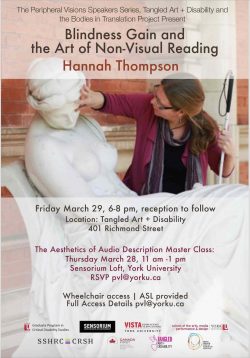Videography by Rajat Nayyer
Peripheral Visions Speakers Series, Tangled Art + Disability and the Bodies in Translation Project co-present:
“Blindness Gain and the Art of Non-Visual Reading”
Friday March 29, 6:00-8:00pm, reception to follow
Location: Tangled Art + Disability, 401 Richmond Street
Wheelchair Access | ASL
Through a discussion of examples from 19th century French literature and art, Professor Thompson argues that blindness is a fruitful theoretical stance available to both blind and non-blind people, Thompson’s Critical Disability Studies approach will dismantle the traditional hierarchy of the senses and invite new ways of beholding familiar texts and images.
Bio: Professor Thompson has published widely on French literature and theory, the body, gender, sexuality and disability. She is the author of three books on French literature and culture including Reviewing Blindness in French Fiction (1789-2013) (Palgrave, 2017), which marks the start of Professor Thompson’s influential work on the cross-overs between French Studies and Critical Disability Studies. Professor Thompson has published two edited volumes: New Approaches to Emile Zola and Corporeal Practices: (Re)Figuring the Body in French Studies (with Julia Prest). In 2015 she co-organised the Blind Creations conference and micro-arts festival with Vanessa Warne and she is the author of the popular Blind Spot Blog.
The Aesthetics of Audio Description Master Class
Thursday, March 28th 11:00am-1:00pm
Sensorium Research Loft (M333), 4th Floor GCFA, York University.
Wheelchair Access | ASL Interpretation Provided
To RSVP email pvl@yorku.ca
The Aesthetics of Audio Description Master Class utilized insights from critical disability studies to explore how audio description might enhance the aesthetic experience of both blind and non-blind beholders. Drawing on articles published in the 2018 special issue of Disability Studies Quarterly, ‘Blindness Arts’, the Master Class explored non-visual ways of engaging with art and artefacts might teach the visually dependent world. When it is made available to everybody and included in the conception of an exhibition or artwork, can audio description be celebrated as a privileged example of “blindness gain” which works to challenge ocularcentric understandings of the hierarchy of the senses?
